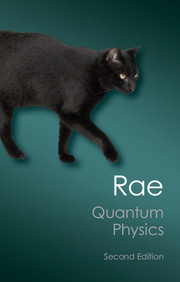Book contents
- Frontmatter
- Dedication
- Contents
- Preface to the first edition
- Preface to the second edition
- 1 Quantum physics
- 2 Which way are the photons pointing?
- 3 What can be hidden in a pair of photons?
- 4 Wonderful Copenhagen?
- 5 Is it all in the mind?
- 6 Many worlds
- 7 Is it a matter of size?
- 8 Backwards and forwards
- 9 Only one way forward?
- 10 Can we be consistent?
- 11 Illusion or reality?
- Further reading
- Index
10 - Can we be consistent?
Published online by Cambridge University Press: 05 February 2014
- Frontmatter
- Dedication
- Contents
- Preface to the first edition
- Preface to the second edition
- 1 Quantum physics
- 2 Which way are the photons pointing?
- 3 What can be hidden in a pair of photons?
- 4 Wonderful Copenhagen?
- 5 Is it all in the mind?
- 6 Many worlds
- 7 Is it a matter of size?
- 8 Backwards and forwards
- 9 Only one way forward?
- 10 Can we be consistent?
- 11 Illusion or reality?
- Further reading
- Index
Summary
Irreversibility, strengthened by the idea of strong mixing, has been discussed in the last two chapters. We reached the conclusion that, once such processes have been involved in a quantum measurement, it is in principle impossible to perform an interference experiment that would demonstrate the continued existence of a superposition. It is then ‘safe’ to assume that the system has ‘really’ collapsed into a state corresponding to one of the possible measurement outcomes. Does this mean that the measurement problem has been solved? Clearly it has for all practical purposes, as has been pointed out several times in earlier chapters. But it may still not be sufficient to provide a completely satisfactory solution in principle: in particular, we note that we have still not properly addressed the question of actualisation outlined at the end of the first section of Chapter 8.
In the present chapter we discuss an interpretation of quantum physics that was developed during the last 15 or so years of the twentieth century and is based on the idea of describing quantum processes in terms of ‘consistent histories’. As we shall see, the resulting theory has much in common with the Copenhagen interpretation discussed in Chapter 4 and when applied to measurement it connects with the viewpoint, discussed in the last chapter, in which irreversible processes are to be taken as the primary reality.
- Type
- Chapter
- Information
- Quantum PhysicsIllusion or Reality?, pp. 118 - 128Publisher: Cambridge University PressPrint publication year: 2012



